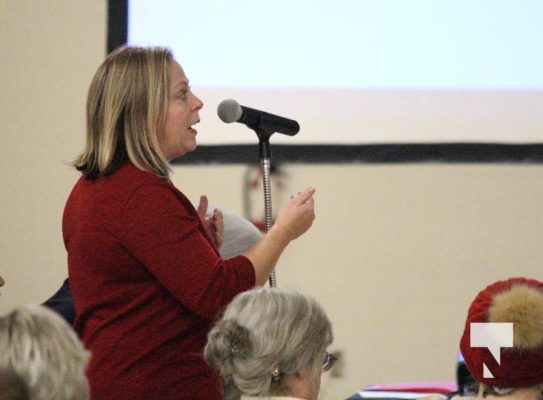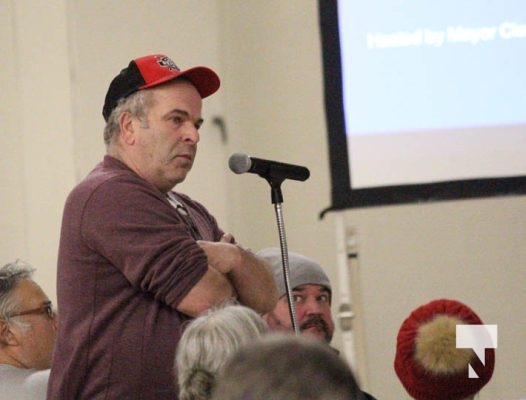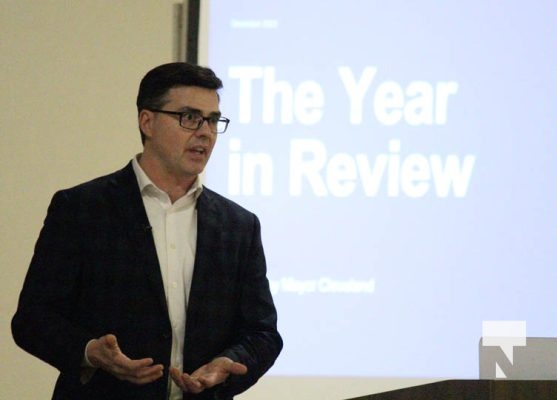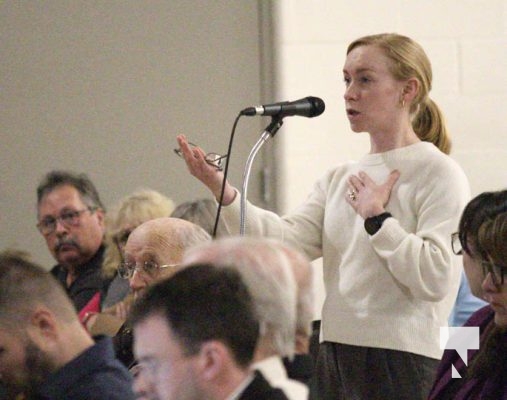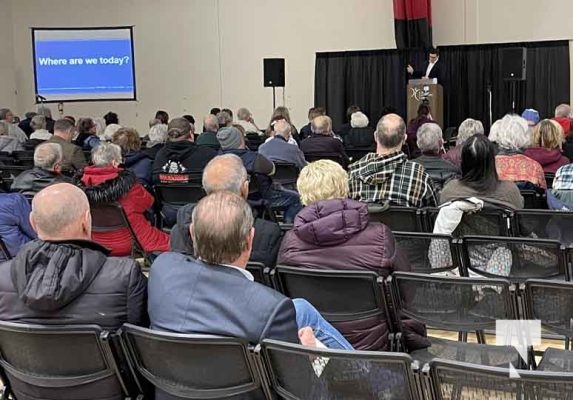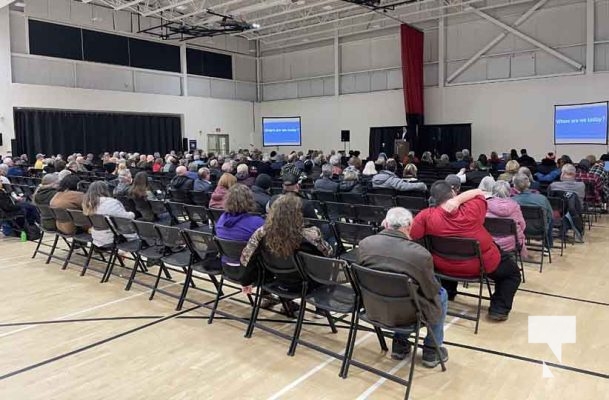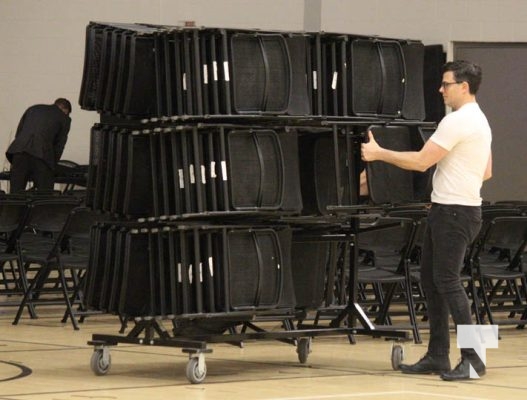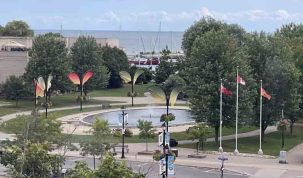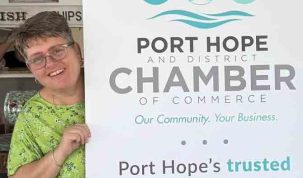By Cecilia Nasmith/Today’s Northumberland
To judge by the questions put to Mayor Lucas Cleveland at Tuesday’s A Year In Review town-hall session, Cobourg residents are most concerned by two things – new steeper storm-water rates and the drugs, crime and other issues that seem to surround the homeless of the community (and those who live near them).
The session – attended by more than 100 people at the Cobourg Community Centre – was his fulfillment of a campaign promise, Cleveland recalled.
The agenda called for a 30- to 45-minute presentation by the mayor, starting at 6:30 p.m., followed by questions until 8:30 p.m. The presentation, however, was still going strong at 7:35 when a woman from the audience called for the questions to begin – which they did, following a short video on Northumberland County’s work to end homelessness.
The encampment was the first topic put by the questioners, and Cleveland explained the challenge.
“Why we are not doing more about the encampment is the number-one question we get asked every single day,” he said.
Prefacing his remarks by saying that he has to be careful not to say anything that can be used against the town legally, he said that the owner of any property is responsible for the actions of anyone entering onto that property. The town has the authority under various provincial laws to pass municipal bylaws to restrain certain activities that contravene bylaw provisions.
However, he continued, in this case, the province cannot necessarily be subject to a municipal bylaw, since Cobourg is not a level of government – since the county itself is created by the province which, in turn creates its municipalities.
“The province has the unique ability to make themselves responsible or not, by certain acts.” Cleveland said, adding that Infrastructure Ontario can also use that same ability.
The town and its departments are investigating the situation behind the scenes, but cannot disclose what is being said.
Waiting second in line to ask a question, a man challenged the mayor in obscene language over the town’s action of closing down several houses throughout town due to unsafe living conditions.
His was one of them. He threw an insult at the mayor and walked out.
Cleveland is a proponent of taking your gripe to the appropriate level of government but, in this case, even Northumberland-Peterborough South MPP David Piccini wouldn’t be the appropriate party since IO is a separate entity.
One man wondered if the town could at least pass some kind of bylaw against using or possessing drugs in such public places as parks and playgrounds.
“I don’t have a personal problem with that,” Cleveland said.
Several property owners were upset over increases in their storm-water rates. A man named Derek spoke of neighbours whose bills range from $1,000 to $16,000 per year.
Cleveland blamed the province’s asset-management policies that require equipment to be replaced at a given point in their lifespan. As well, he said, the service is run on a full cost-recovery basis.
And the town’s contribution has until now been less than half of what it should be.
Rates have been set, he said, and bills are rendered on an equitable basis, based on the size and type of property.
And while Cleveland urged everyone to look at it as a universal service for which all need to pay, a man named Alan noted dozens of houses that don’t receive this service. And that’s on top of rural farm properties (like his own) on the town’s northwest and northeast edges that also lack the service.
“I know at least three taxpayers whose bills are almost $30,000,” he said.
The cost is not based on how much you use the service, the mayor responded, it’s a cost to make sure the service is available to control, treat and collect storm water.
“If you own 30 or 40 acres, it’s going to be expensive, Eventually those lands will be developed, so it’s an incredibly equitable way.”
Several other people refused to concede that the system is fair to those who don’t benefit from it, and a man named Peter referred to an “unprecedented” 800% increase.
“The majority of Cobourg residents are not seeing a massive increase,” the mayor responded.
“It may disproportionately affect some but, at the end of the day, there’s not a more equitable way to act.”
Other questions had to do with the new governance model that will take effect next month, anticipated tax increases in light of a 6% target increase for the 2024 budget, the town’s transit system, parking, and the lack of lifeguards on the beach.
One man even won a round of applause by thanking the councillors for their work on an incredibly tough job.
Cleveland’s presentation prior to the questions said that he hoped the event would address “the same conversations over and over, the same five questions” he hears as a result of his open-door policy – many of which would not be asked if residents had a clearer understanding of what the town can and cannot do.
The unfortunate thing about living in a town Cleveland characterized as the gem by the lake is that residents don’t want it to change. But change is inevitable – and, in the case of the COVID-19 pandemic, sometimes profound.
Cleveland did have accomplishments to be proud of, like the fact that there are 300% more building starts this year compared to the previous three years (including many affordable, rent-geared-to-income and transitional housing units).
The biggest challenge is to keep levels of service (much less increase them, as he is asked to do every day), without doing one of two things that nobody wants – raise taxes or find the money for these improvements by cutting something else.
As they work toward the 2024 budget, Cleveland noted, “80 to 85% of our budget is pretty much predetermined.” And years of cutting the fat in individual departments has left the town with no wiggle room to cut deeper.
And if your household is struggling with inflation, he added, the town is paying those higher prices for whatever it needs as well.
One thing they can do (and have been working on) is what he called foundational work – the governance review, the fire master plan, and the strategic plan that identified the three priorities of thriving community, service excellence and sustainability. This kind of work work that will provide a strong basis for whatever new challenge might come along, Cleveland said.


